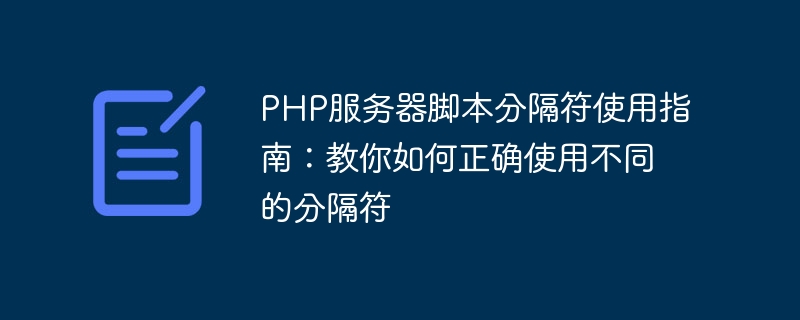

PHP Server Script Delimiter Usage Guide: Teach you how to use different delimiters correctly, specific code examples are required
Introduction:
In PHP development, Using appropriate delimiters is important for writing clear and readable code. Different delimiters can help us better organize and structure our code. This article will introduce some commonly used delimiters and provide practical code examples.
1. Semicolon (;):
The semicolon is the most commonly used delimiter in PHP. It is used to separate statements and tell the interpreter where a line of code ends. For example:
<?php
$name = "John";
echo "Hello, " . $name . ";";
?>In the above code, a semicolon is used to end each line of code.
2. Curly braces ({}):
Curly braces are used to define code blocks and are often used in functions and loop statements. For example:
<?php
function sayHello() {
echo "Hello!";
}
if (true) {
echo "This is true!";
}
?>In the above code, curly braces define the starting and ending positions of functions and if statements.
3. Colon (:) and end symbol (end):
The colon and end keywords are usually used to define code blocks, especially suitable for use with flow control statements (such as if statements and loop statements) . For example:
<?php
$num = 3;
if ($num == 1):
echo "Number is 1";
elseif ($num == 2):
echo "Number is 2";
else:
echo "Number is not 1 or 2";
endif;
?>In the above code, the colon and the end keyword limit the starting and ending positions of the if statement.
4. Parentheses (()):
Penparenthes are usually used in parameter lists of functions and methods, and can also be used in the conditional part of control flow statements. For example:
<?php
function sayHello($name) {
echo "Hello, " . $name . "!";
}
if (true) {
echo "This is true!";
}
?>In the above code, parentheses are used for function parameters and conditional parts in if statements.
5. Quotation marks and double quotation marks ('' and ""):
Quotation marks and double quotation marks are used to wrap strings, and can also be used to wrap HTML tags, etc. For example:
<?php
$name = "John";
echo 'Hello, ' . $name . '!';
echo "<h1>Welcome</h1>";
?>In the above code, quotation marks and double quotation marks are used to wrap strings and HTML tags.
6. Backslash ():
Backslash is used to escape characters to give them special meaning. For example:
<?php
echo "This is "quoted" text.";
echo 'This is 'quoted' text.';
echo "This is a backslash: \";
?>In the above code, backslashes are used to escape quotes and other special characters.
Conclusion:
This article introduces commonly used delimiters in PHP server scripts and provides corresponding code examples. Proficient use of different delimiters helps to write clear and readable code and improve development efficiency. In actual development, choose appropriate delimiters as needed to optimize the code structure.
By reading this article, I hope readers can have a more comprehensive understanding of the use of PHP server script delimiters and be able to use them flexibly in actual development.
The above is the detailed content of Learn to use different PHP server script delimiters and avoid common usage errors. For more information, please follow other related articles on the PHP Chinese website!
 Compare the similarities and differences between two columns of data in excel
Compare the similarities and differences between two columns of data in excel
 Win10 My Computer Icon Retrieval Tutorial
Win10 My Computer Icon Retrieval Tutorial
 sort sorting function usage
sort sorting function usage
 How to install printer driver in linux
How to install printer driver in linux
 How to unlock android permission restrictions
How to unlock android permission restrictions
 excel duplicate item filter color
excel duplicate item filter color
 what is optimization
what is optimization
 How to repair sql database
How to repair sql database
 How to use append in python
How to use append in python




